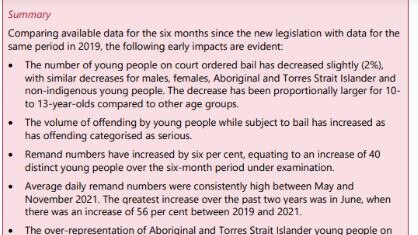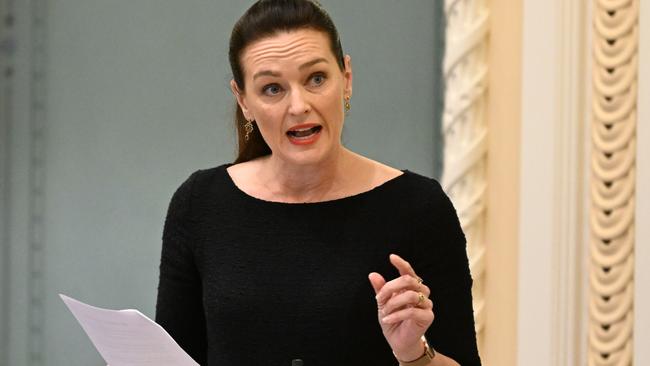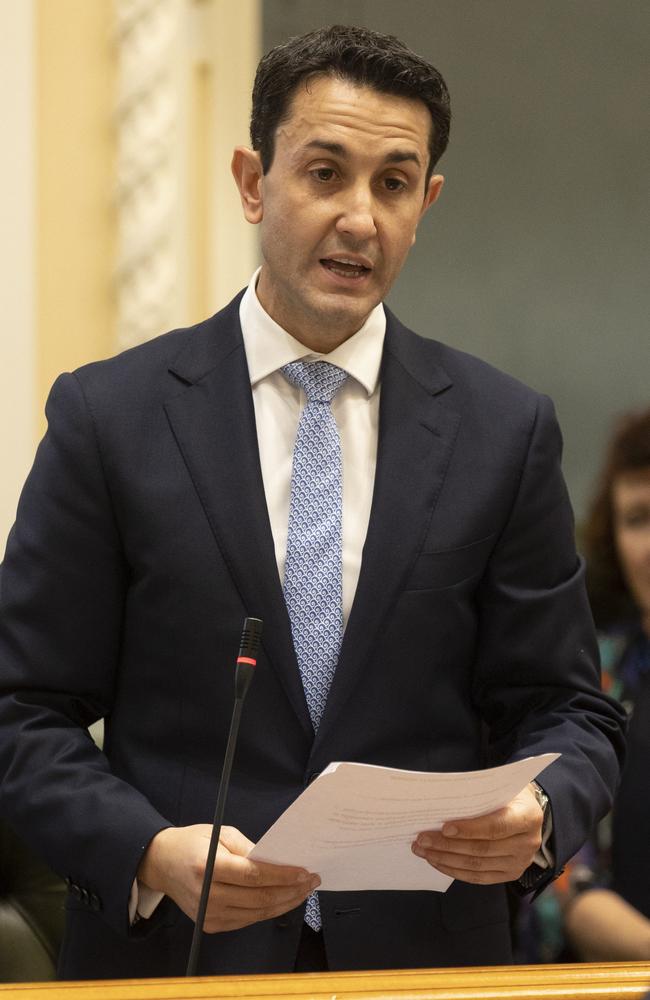State government accused of playing politics with findings of Youth Justice Reform Review
A damning revelation in the Palaszczuk government’s 168-page Youth Justice Reform Review has revealed that in the six months after new laws were passed in April 2021, the volume of youth offending while on bail increased.
QLD Politics
Don't miss out on the headlines from QLD Politics. Followed categories will be added to My News.
A damning revelation in the Palaszczuk government’s 168-page Youth Justice Reform Review has revealed that in the six months after new laws were passed in April 2021, the volume of youth offending while subject to bail increased.
The state government was accused of playing political games by releasing the findings of a crucial 168-page report into youth justice reforms at 8.17pm last night.
The final Youth Justice Reform Review, compiled by former Police Commissioner Bob Atkinson, was handed to the government in March this year, but was only released to the public late on Tuesday night, following a week of controversy within the Queensland Police Service.
Section nine of the report titled ‘Early impacts of reforms’ found that there had been an increase in the Serious Repeat Offender Index (SROI) with average daily remand numbers “consistently high between May and November 2021”.

“The greatest increase over the past two years was in June, when there was an increase of 56 per cent between 2019 and 2021,” the report reads.
“The proportion of young people offending on bail increased from 47 per cent in 2019 to 53 per cent in 2021.
“For the same period, the proportion of serious offending on bail increased from 14 per cent to 19 per cent.
“The number and proportion of distinct young people on bail who committed a further offence that led to serious harm or death also increased from 60 (5 per cent of all young people on bail) in 2019 to 78 (7 per cent of all young people on bail).”
“Among the sentenced population, the proportion of the SROI cohorts also rose, from 61 per cent in 2019 to 65 per cent in 2021.”

It was revealed this week that children are being locked up in watch-houses, despite the government saying back in 2019 they were solving the problem; audio of shocking racism at the Brisbane Watchhouse was leaked by a whistleblower; and Police Commissioner Katarina Carroll has been forced to defend her leadership amid mounting pressure over a litany of controversies in the past six months, including the shocking evidence given at the Commission of Inquiry into Queensland Police Service Responses to Domestic and Family Violence.
In the release sent out to media after 8pm on Tuesday night, Minister Leanne Linard said the report would be “cold comfort” to victims of crime, but it showed the government’s youth justice reforms were working.
“We have put community safety first since we came into government and when Queenslanders said they wanted more done, we did more,” Ms Linard said.
“When we made amendments to the Youth Justice Act last year, we were determined to make the small number of serious repeat offenders more accountable for their behaviour. And this review shows we’ve done just that – there has been a decrease in the proportion of serious recidivist offenders on bail, in line with the presumption against bail reform. Our bail laws are among the toughest in the nation and it means more offenders are being remanded in custody, which means Queensland communities are safer.
“While this is cold comfort to victims of crime, it does mean our initiatives and legislative changes are having an impact, especially on that small cohort responsible for close to half the offences committed by young people.”
Member for Traeger Robbie Katter said the Palaszczuk government is “paralysed” by youth crime.
“Youth offenders are being further criminalised by a broken youth justice system that fails on all fronts – it is neither protecting communities nor is it effectively reforming or deterring recidivist offenders,” he said.
“The Palaszczuk Labor Government is paralysed by this issue, but it is a simple fact that in 2022 Queensland children are committing more serious and violent offences than ever before.”
Mr Katter said children are being held in custody for an average of 40 days a “blip on the radar and a woeful indictment on not only how seriously the government takes the harm these kids are causing to communities but also how invested it is in their reform”.
“Today the KAP is calling on the Palaszczuk Labor Government to formally withdraw from any national discussions in relation to raising the age of criminal responsibility, which would effectively destroy any legal avenue for dealing with youth offenders under 14,” he said.
“The level of harm that could be wrought on the community as a result would be unbearable.
“We want to see stricter youth justice laws in place and an alternative sentencing model – known as Relocation Sentencing – trialled as a matter of urgency.
“Get these kids out of town and removed from the environments that have led them down this path – Give them, and our communities, a chance.”

But opposition leader David Crisafulli said it was another case of smoke and mirrors, with the government offering up a report to take eyes off the controversy surrounding the QPS and youth justice.
“The government has had this report for months and they choose to release it in the dead of night, on the day when their youth crime credentials are in tatters, that says it all,” he said.
“If Queenslanders need any proof as to how the government sees this as a political problem, rather than a Queensland family problem, the fact it’s been released so late in the evening tells you everything you need to know.
“This is more about political protection than the protection of Queensland families.”
Mr Atkinson said the reforms should be continued.
“We interviewed key stakeholders to get a better understanding of the effectiveness of the government’s youth justice reforms and the continual monitoring of these reforms,” he said. “The key takeaway was that the reforms were worthwhile and should be continued.”



